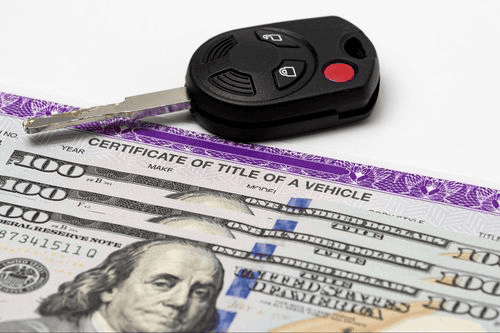Table of Contents
- Importance of Vehicle Titles
- How to Get the Title After Paying Off a Car Loan
- What Do I Need to Get My Title After Paying Off My Car Loan?
- Understanding the Role of Lienholders and Liens With Titles
- What if I Can’t Find the Lienholder and I Need to Pay Off My Car Loan?
- How Do I Get a Payoff Letter for My Car Loan?
- How Long Does It Take to Get a Vehicle Title for a Paid-off Car?
- Can You Get a Title on a Car That Is Not Fully Paid Off?
- What Happens When a Car Is Paid Off?
- What to Do After a Car Loan Is Paid Off?
While you are financing your vehicle you are not the true owner of the car. But after you’ve made the final payment on your loan, the next step is to get the title from your lienholder and become the car’s full owner! The process and timeframe for getting a vehicle title for a paid off car can typically vary from state to state, but it isn’t as complicated as you might think.
Importance of Vehicle Titles
A car title, known as a pink slip in states like California, is a legal document that proves ownership of a vehicle. This document has information about the vehicle, including its Vehicle Identification Number (VIN) and the car’s make, model, and year. A car title is an important document to keep track of because without this document, you will not be able to sell your vehicle, and it is typically more difficult to prove that you are the car’s rightful owner.
When you take out a car loan, the lender or applicable financial institution places a lien on your car’s title once the loan is funded. You will not be able to sell your car while a lien is active on its title because, as mentioned above, you are not the full owner of the vehicle. Your lender has a legal right to your vehicle while you are still making payments on your loan.
Electronic Titles
If your state uses the Electronic Lien and Title system (ELT), the process of getting a vehicle title for a paid off car is a lot simpler. This system is essentially a database that connects lenders, dealers, and other applicable institutions to the Department of Motor Vehicles (or state equivalent) so they can access the most current information on the car owners and their registered vehicles in the state.
Electronic titles will carry the same information as paper titles and are maintained by the applicable government agency, such as the Department of Motor Vehicles (DMV), Bureau of Motor Vehicles (BMV), etc. The process to obtain an electronic title is similar to a paper one and often requires the same documentation.
How to Get the Title After Paying Off a Car Loan

After you’ve made the final payment on your car loan, the lender will release the lien present on your car’s title. The next steps you will need to take to get the title after paying off the loan can vary depending on a few different factors, including your state of residence and whether your state uses the ELT system.
Elt State Process to Get Your Title
In some states, you are expected to do all of the legwork to get your title. But if you live in a state with an ELT, you’ll automatically be sent a new title within a month or so of making the final payment on your loan. It may take more than a month if the DMV or applicable government agency in your state has a backlog of releases to process.
Non-elt State Process to Get Your Title
If you don’t live in a state that participates in the ELT system, you may have to take care of the paperwork yourself. The exact process to get your title will depend on whether you live in a title-holding or a non-title holding state. For example, if you live in a title-holding state like Michigan or Kentucky and an ELT is not used, you will be responsible for handling most of the process. When your loan is paid off, your lender will send a lien release form and the appropriate documentation that indicates your loan is paid in full. Once you have these documents on hand, you are ready to get your car’s title! But, you may be required to submit your paperwork by mail or in person at the DMV.
What Do I Need to Get My Title After Paying Off My Car Loan?
Some of the most common documents you may need to obtain your car’s title after paying off your loan include:
- Proof of Identity, Like a Valid Driver’s License
- Lien Release Document
- Proof of Vehicle Insurance (Not Always Required)
- Completed Application Form for Vehicle Title and/ or Registration
- Payment for the Applicable Fees
The exact paperwork you will need to get your car’s title after paying off your loan can vary, so it’s a smart idea to check with your local DMV for more information. The DMV is responsible for issuing and processing car titles, and their website can typically provide you with specific instructions on how to submit the documents, along with the preferred methods of payment for the fees.
Understanding the Role of Lienholders and Liens With Titles
Liens are not exclusive to car loans. A lien is essentially a legal claim to an asset while the debtor owes money to the creditor or applicable party. Typically, a lien is added to the title of an asset because it was used as collateral for a loan, such as a mortgage loan, title loan, etc.
When you finance a vehicle, a lien will be present on your car’s title until it is removed by the lienholder. Since the lien is the lender’s legal right to your car while you are paying off your loan, your priority should be to stay on top of your payments as much as possible. If your loan does not stay in good standing and enters default, your lienholder has the legal right to repossess your vehicle.
What if I Can’t Find the Lienholder and I Need to Pay Off My Car Loan?
If you are trying to pay off your car loan and you can’t find the lienholder, you may run into some challenges during this process. The lienholder may have merged with another organization or rebranded and changed their name midway through your loan. If you are in this situation, check out the following tips to resolve it:
- Search Public Records: The simplest (and often easiest) option may be to check your state’s motor vehicle agency or counter recorder’s office for any available lienholder information. You may be able to access a stored list of lenders and lienholders on their website! Use this resource to check if your lending company or lienholder is listed as a subsidiary of another or if they’ve recently changed their name.
- Consult a Professional: If the first option is a dead end, seek advice from a legal professional experienced in handling lien issues.
How Do I Get a Payoff Letter for My Car Loan?
Before the end of your loan term, you can request a payoff letter, which is a document that outlines the exact amount of money you need to close your car loan. Typically, you can request this letter by visiting your lender’s website and submitting an online request. If that option isn’t available, another way to receive a payoff letter is to call your lender’s customer service department and speak with an agent directly.
How Long Does It Take to Get a Vehicle Title for a Paid-off Car?
Typically, it takes 2-6 weeks to receive your car title after paying off your loan. Whether you live in a title-holding or non-title holding state, the processing time may vary depending on state laws pertaining to title processing timelines, the DMV’s workload and other factors, like the efficiency of the lienholder or lender. But, if your paperwork was submitted manually, the wait time will likely be longer. If you live in a non-title holding state when your loan is paid off, your lender will send the lien release to the DMV or applicable agency in your state, and you will receive an updated title through the mail.
Can You Get a Title on a Car That Is Not Fully Paid Off?
Unless you live in a non-title holding state, you can’t get the car title while you have an outstanding balance on your auto loan. You will need to wait to start the process to get your car’s title until after you’ve fulfilled all of the necessary payment obligations.
What Happens When a Car Is Paid Off?

If you’ve made the final payment on your car loan, the next step is to become the sole owner of your vehicle on your car’s title. When a car is paid off, the lien is released from the title by the lienholder and the car is no longer being financed. While congratulations are in order if you’ve recently paid off your car loan, there are a few things that can happen after your loan is paid in full.
Your credit score may be negatively affected if you’ve paid off your loan. While that seems unfair, it is a possibility if your car loan was your only installment loan and your credit mix is no longer diversified. Your credit mix accounts for around 10% of how your score is calculated and shows creditors that you are capable of handling different types of debt, such as mortgages, loans, credit cards, etc. Additionally, if your car loan was your only open account with a low balance, paying off the loan and closing the account can negatively impact your score. It’s important to check your credit report after paying off your car loan to see where your score stands.
After your car is paid off, make sure to contact your insurance company and notify them of the lien release on your car’s title, so they can remove the lienholder from your policy. You have the opportunity to get different insurance rates! Lenders and lienholders may require you to have additional coverage to protect your car as much as possible during the repayment process. You may need to have comprehensive or collision coverage while paying off your car loan, which is typically more expensive than liability coverage. Liability coverage is the coverage type that drivers are required to have in most states. After you’ve made the final payment on your loan, you have more freedom with your car insurance coverage! Take some time to shop around and compare different options to make sure that you are getting the best price for the coverage and policy that you want.
What to Do After a Car Loan Is Paid Off?
Once you receive your car’s title, you should make an effort to keep this document in a safe place. You will need it if you decide to transfer ownership of the vehicle, register it in a new state, or use it as collateral for a title loan. You may want to make a few copies of the title and store them separately in secure locations to make sure that you have a backup copy!





